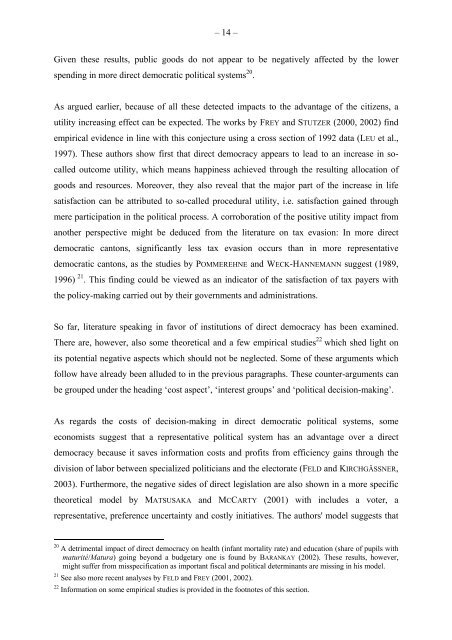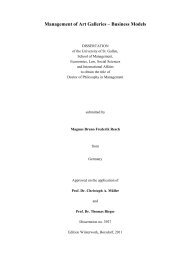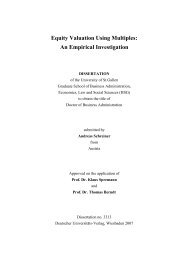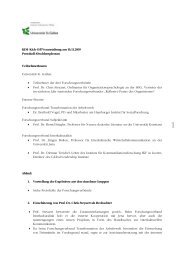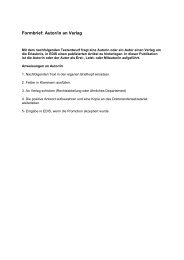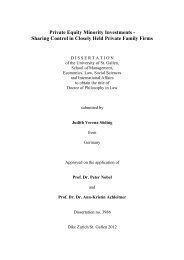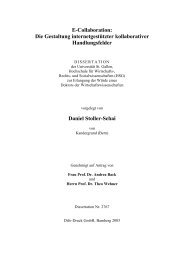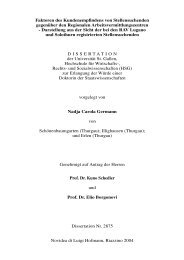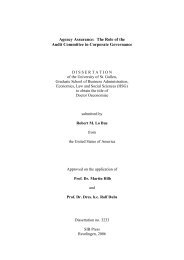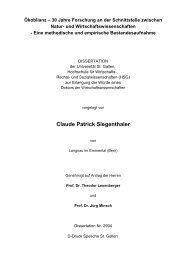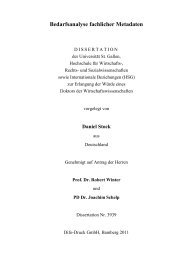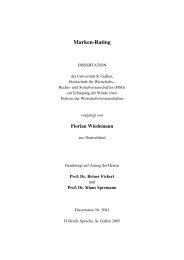The Impact of Direct Democracy on Society - Universität St.Gallen
The Impact of Direct Democracy on Society - Universität St.Gallen
The Impact of Direct Democracy on Society - Universität St.Gallen
- No tags were found...
Create successful ePaper yourself
Turn your PDF publications into a flip-book with our unique Google optimized e-Paper software.
– 14 –Given these results, public goods do not appear to be negatively affected by the lowerspending in more direct democratic political systems 20 .As argued earlier, because <str<strong>on</strong>g>of</str<strong>on</strong>g> all these detected impacts to the advantage <str<strong>on</strong>g>of</str<strong>on</strong>g> the citizens, autility increasing effect can be expected. <str<strong>on</strong>g>The</str<strong>on</strong>g> works by FREY and STUTZER (2000, 2002) findempirical evidence in line with this c<strong>on</strong>jecture using a cross secti<strong>on</strong> <str<strong>on</strong>g>of</str<strong>on</strong>g> 1992 data (LEU et al.,1997). <str<strong>on</strong>g>The</str<strong>on</strong>g>se authors show first that direct democracy appears to lead to an increase in socalledoutcome utility, which means happiness achieved through the resulting allocati<strong>on</strong> <str<strong>on</strong>g>of</str<strong>on</strong>g>goods and resources. Moreover, they also reveal that the major part <str<strong>on</strong>g>of</str<strong>on</strong>g> the increase in lifesatisfacti<strong>on</strong> can be attributed to so-called procedural utility, i.e. satisfacti<strong>on</strong> gained throughmere participati<strong>on</strong> in the political process. A corroborati<strong>on</strong> <str<strong>on</strong>g>of</str<strong>on</strong>g> the positive utility impact fromanother perspective might be deduced from the literature <strong>on</strong> tax evasi<strong>on</strong>: In more directdemocratic cant<strong>on</strong>s, significantly less tax evasi<strong>on</strong> occurs than in more representativedemocratic cant<strong>on</strong>s, as the studies by POMMEREHNE and WECK-HANNEMANN suggest (1989,1996) 21 . This finding could be viewed as an indicator <str<strong>on</strong>g>of</str<strong>on</strong>g> the satisfacti<strong>on</strong> <str<strong>on</strong>g>of</str<strong>on</strong>g> tax payers withthe policy-making carried out by their governments and administrati<strong>on</strong>s.So far, literature speaking in favor <str<strong>on</strong>g>of</str<strong>on</strong>g> instituti<strong>on</strong>s <str<strong>on</strong>g>of</str<strong>on</strong>g> direct democracy has been examined.<str<strong>on</strong>g>The</str<strong>on</strong>g>re are, however, also some theoretical and a few empirical studies 22 which shed light <strong>on</strong>its potential negative aspects which should not be neglected. Some <str<strong>on</strong>g>of</str<strong>on</strong>g> these arguments whichfollow have already been alluded to in the previous paragraphs. <str<strong>on</strong>g>The</str<strong>on</strong>g>se counter-arguments canbe grouped under the heading ‘cost aspect’, ‘interest groups’ and ‘political decisi<strong>on</strong>-making’.As regards the costs <str<strong>on</strong>g>of</str<strong>on</strong>g> decisi<strong>on</strong>-making in direct democratic political systems, someec<strong>on</strong>omists suggest that a representative political system has an advantage over a directdemocracy because it saves informati<strong>on</strong> costs and pr<str<strong>on</strong>g>of</str<strong>on</strong>g>its from efficiency gains through thedivisi<strong>on</strong> <str<strong>on</strong>g>of</str<strong>on</strong>g> labor between specialized politicians and the electorate (FELD and KIRCHGÄSSNER,2003). Furthermore, the negative sides <str<strong>on</strong>g>of</str<strong>on</strong>g> direct legislati<strong>on</strong> are also shown in a more specifictheoretical model by MATSUSAKA and MCCARTY (2001) with includes a voter, arepresentative, preference uncertainty and costly initiatives. <str<strong>on</strong>g>The</str<strong>on</strong>g> authors' model suggests that20 A detrimental impact <str<strong>on</strong>g>of</str<strong>on</strong>g> direct democracy <strong>on</strong> health (infant mortality rate) and educati<strong>on</strong> (share <str<strong>on</strong>g>of</str<strong>on</strong>g> pupils withmaturité/Matura) going bey<strong>on</strong>d a budgetary <strong>on</strong>e is found by BARANKAY (2002). <str<strong>on</strong>g>The</str<strong>on</strong>g>se results, however,might suffer from misspecificati<strong>on</strong> as important fiscal and political determinants are missing in his model.21 See also more recent analyses by FELD and FREY (2001, 2002).22 Informati<strong>on</strong> <strong>on</strong> some empirical studies is provided in the footnotes <str<strong>on</strong>g>of</str<strong>on</strong>g> this secti<strong>on</strong>.


